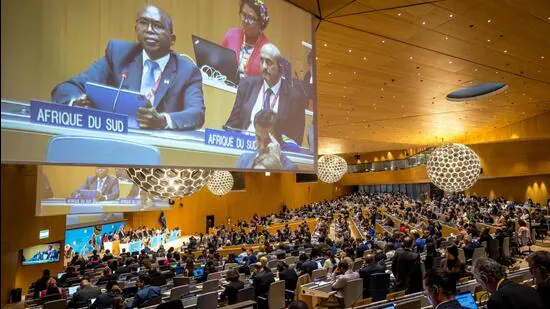Context:
Recently, the World Intellectual Property Organization (WIPO) adopted a new treaty on Genetic resources and associated traditional knowledge.
More on news
- The new treaty was adopted on May 24 in Geneva after 192 countries and 86 observers participated in the two-week negotiations from May 13-24 at a Diplomatic Conference.
- This treaty marks a big win for India and the Global South as it was adopted after two decades of negotiations and with collective support at the multilateral forum, with a consensus among more than 150 countries.
As per the treaty, it will be mandatory for patent applicants to disclose the country of origin or source of genetic resources if the claimed invention is based on those materials (genetic resources) or associated traditional knowledge.
- The current patent legislation does not have a mandatory provision requiring patent applicants to disclose the country of origin or source in cases where the invention is based on genetic resources.
- Only 35 countries have some form of disclosure obligations.
For the first time the connection between local communities and their Genetic resources (GRs) and associated with traditional knowledge (ATK) is recognised in the global intellectual property (IP) community.
- Genetic resources (GRs) are present in things like medicinal plants, crops, and animal breeds. While genetic resources themselves cannot be directly protected as intellectual property, inventions developed using them can, most often through a patent.
World Intellectual Property Organization (WIPO)
- It is a UN agency, established in 1967 that promotes international cooperation on intellectual property (IP).
- It acts as a global forum for IP discussions, administers international IP treaties, and provides services like registration and dispute resolution.
- It is a self-funding agency, with 193 member states.
- India joined the WIPO in 1975.
- Headquarters: Geneva, Switzerland.
What is Intellectual Property (IP)?
- Intellectual property rights (IPR) refers to the legal rights given to the inventor or creator (exclusive rights) to protect his invention or creation for a certain period.
- It is an original creation of the human intellect such as artistic, literary, technical, or scientific creation.
Significance of the treaty
- The treaty will not only safeguard and protect biodiversity but will increase transparency in the patent system and strengthen innovation.
- This treaty fosters a balance between intellectual property rights and biodiversity conservation protection of biodiversity.
- Through this, the IP system can continue to incentivize innovation while evolving in a more inclusive way, responding to the needs of all countries and their communities.
- The treaty marks the start of the journey to achieve collective growth and deliver the promise of a sustainable future, a cause which India has championed for centuries.

